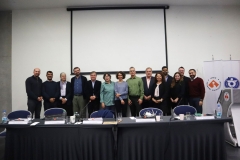
FACULTY OF BUSINESS
Department of Political Science and International Relations
PSIR 436 | Course Introduction and Application Information
| Course Name |
Nationalism and Identity Politics
|
|
Code
|
Semester
|
Theory
(hour/week) |
Application/Lab
(hour/week) |
Local Credits
|
ECTS
|
|
PSIR 436
|
Fall/Spring
|
3
|
0
|
3
|
6
|
| Prerequisites |
None
|
|||||
| Course Language |
English
|
|||||
| Course Type |
Elective
|
|||||
| Course Level |
First Cycle
|
|||||
| Mode of Delivery | face to face | |||||
| Teaching Methods and Techniques of the Course | - | |||||
| Course Coordinator | - | |||||
| Course Lecturer(s) | ||||||
| Assistant(s) | ||||||
| Course Objectives | The objective of this course is to introduce the basic concepts, theories and contemporary debates in the study of nationalism and politics of national identity. |
| Learning Outcomes |
The students who succeeded in this course;
|
| Course Description | Nationalism has been one of the most enduring forces in modern world politics. The debates surrounding nationalism have been impacting the politics of citizenship, identity, minorities and immigration. This course will discuss the main concepts, theories and approaches in the study of nationalism with references to historical and contemporary cases around the world. |
|
|
Core Courses | |
| Major Area Courses |
X
|
|
| Supportive Courses | ||
| Media and Management Skills Courses | ||
| Transferable Skill Courses |
WEEKLY SUBJECTS AND RELATED PREPARATION STUDIES
| Week | Subjects | Related Preparation |
| 1 | Introduction | |
| 2 | Key Concepts: Race, Ethnicity, Nation, Nationalism | Renan, Ernest. [1882]. “What is a Nation?” http://ucparis.fr/files/9313/6549/9943/What_is_a_Nation.pdf ; Chandra, Kanchan. 2006. "What is ethnic identity and does it matter?" Annual Review of Political Science 9: 397-424; Smith, Anthony D. 2010. Nationalism – Theory, Ideology, History. Cambridge: Polity, pp.5-24. |
| 3 | Major Theories of Nationalism: Primordial and Modernist Approaches-I | Spencer, Philip and Howard Wollman. 2002. Nationalism – A Critical Introduction. London: Sage Publications, pp.26-56; Smith, Anthony D. 2010. Nationalism – Theory, Ideology, History. Cambridge: Polity, pp.47-65; Leoussi, A. 2016. "Nationalism." In: The Blackwell Encyclopedia of Sociology. |
| 4 | Major Theories of Nationalism: Primordial and Modernist Approaches-II | Spencer, Philip and Howard Wollman. 2002. Nationalism – A Critical Introduction. London: Sage Publications, pp.26-56; Smith, Anthony D. 2010. Nationalism – Theory, Ideology, History. Cambridge: Polity, pp.47-65; Mylonas, Harris and Maya Tudor. 2021. “Nationalism: What We Know and What We Still Need to Know.” Annual Review of Political Science, 24:1, 109-132. |
| 5 | Varieties of Nationalism: Civic vs. Ethnic Definitions | Spencer, Philip and Howard Wollman. 2002. Nationalism – A Critical Introduction. London: Sage Publications, pp.94-104; Smith, Anthony D. 2010. Nationalism – Theory, Ideology, History. Cambridge: Polity, pp.39-46; Anderson, Benedict. May/June 2001. “Western Nationalism and Eastern Nationalism – Is There a Difference That Matters?” New Left Review No. 9, pp. 31-42, https://newleftreview.org/issues/II9/articles/benedict-anderson-western-nationalism-and-eastern-nationalism; Al, Serhun (2019) Patterns of Nationhood and Saving the State in Turkey, Routledge, Chapter 2. |
| 6 | Nation-Building and Citizenship | Spencer, Philip and Howard Wollman. 2002. Nationalism – A Critical Introduction. London: Sage Publications, pp.105-120; Turner, Bryan S. 2006. “Citizenship, Nationalism and Nation-building”. In Gerard Delanty and Krishan Kumar (eds.) The Sage Handbook of Nations and Nationalism. London, Thousand Oaks and New Delhi: Sage Publications, pp. 225–36; Rogers M. Smith (2001) Citizenship and the Politics of People-Building, Citizenship Studies, 5:1, 73 |
| 7 | Midterm Exam | |
| 8 | Nationalism, International Relations and State Politics | Posen, Barry. 1993. Nationalism, the Mass Army, and Military Power. International Security, 18(2), 80–124; Tilly, Charles. 1994. “States and Nationalism in Europe: 1492–1992”. Theory and Society 23 (1): 131–146; Levi-Faur, David. 1997. Economic Nationalism: From Friedrich List to Robert Reich. Review of International Studies 23: 359–70; Landau, Jacob M. 2000. |
| 9 | Nationalism and Violence: Ethnic Cleansing and Civil War | Brubaker, Rogers and Laitin, David. 1998. Ethnic and Nationalist Violence. Annual Review of Sociology, 24(1): 423-452; Bulutgil, Zeynep. 2015. “Social cleavages, wartime experience, and ethnic cleansing in Europe,” Journal of Peace Research, Volume: 52.5: 577-590; Wimmer, Andreas, Lars-Erik Cederman, and Brian Min. 2009. "Ethnic politics and armed conflict: A configurational analysis of a new global data set." American Sociological Review 74.2: 316-337. |
| 10 | Identity Politics and Minority Rights | Gutman, Amy. 2004. Identity in Democracy. Princeton and Oxford: Princeton University Press, pp. 1–37; Bishai, Linda S. 1998. Sovereignty and Minority Rights. Interrelations and Implications. Global Governance 4: 157–82; Kymlicka, W. ve Rubio Marín, R. (1999), ‘Liberalism and Minority Rights. An Interview.’ Ratio Juris, 12: 133-152.; |
| 11 | Nationalism, Populism and Immigration | De Cleen, B. (2017). Populism and nationalism. In C. Rovira Kaltwasser, P. Taggart, P. Ostiguy, & P. Ochoa Espejo (Eds.), Handbook of populism (pp. 342-362). Oxford: Oxford University Press; Cynthia Miller-Idriss (2019) The Global Dimensions of Populist Nationalism, The International Spectator, 54:2, 17-34; Shehaj, Albana, Adrian J Shin, and Ronald Inglehart. “Immigration and Right-Wing Populism: An Origin Story.” Party Politics 27, no. 2 (March 2021): 282–93. |
| 12 | Case Studies | Al, Serhun (2015) Elite Discourses, Nationalism and Moderation: A Dialectical Analysis of Turkish and Kurdish Nationalisms, Ethnopolitics, 14:1, 94-112; Al, Serhun (2015), An Anatomy of Nationhood and the Question of Assimilation: Debates on Turkishness Revisited, Studies in Ethnicity and Nationalism, 15: 83-101 |
| 13 | Student Presentations | |
| 14 | Student Presentations | |
| 15 | Review of the semester | |
| 16 | Final Exam |
| Course Notes/Textbooks | Smith, Anthony D. 2010. Nationalism – Theory, Ideology, History. Cambridge: Polity Spencer, Philip and Howard Wollman. 2002. Nationalism – A Critical Introduction. London: Sage Publications. *All course readings are available at the University Library and as open sources. |
| Suggested Readings/Materials | GELLNER, Ernest. 1983. Nations and Nationalism. Oxford: Basil Blackwell. ANDERSON, Benedict. 1983. Imagined Communities: Reflections on the Origin and Spread of Nationalism. Verso. GIDDENS, Anthony. 1985. The Nation-state and Violence. Cambridge: Polity Press. HOBSBAWM, Eric J. 1990. Nations and nationalism since 1780: programme, myth, reality. New York, NY: Cambridge University Press. BRUBAKER, Rogers. 1992. Citizenship and Nationhood in France and Germany. Harvard University Press. SOYSAL, Yasemin. 1994. Limits of Citizenship: Migrants and Postnational Membership in Europe. University of Chicago Press. SMITH, Anthony D. 2003. Nationalism and Modernism. London and New York: Routledge. WIMMER, Andreas. 2013. Waves of War: Nationalism, State Formation, and Ethnic Exclusion in the Modern World. Cambridge University Press. WIMMER, Andreas. 2018. Nation Building: Why Some Countries Come Together While Others Fall Apart. Princeton University Press. AL, Serhun. 2019. Patterns of Nationhood and Saving the State in Turkey: Ottomanism, Nationalism and Multiculturalism. Routledge. JOPPKE, Christian. 2021. Neoliberal Nationalism: Immigration and the Rise of the Populist Right. Cambridge University Press. |
EVALUATION SYSTEM
| Semester Activities | Number | Weigthing |
| Participation |
1
|
10
|
| Laboratory / Application | ||
| Field Work | ||
| Quizzes / Studio Critiques | ||
| Portfolio | ||
| Homework / Assignments |
1
|
15
|
| Presentation / Jury |
1
|
10
|
| Project | ||
| Seminar / Workshop | ||
| Oral Exams | ||
| Midterm |
1
|
30
|
| Final Exam |
1
|
35
|
| Total |
| Weighting of Semester Activities on the Final Grade |
4
|
65
|
| Weighting of End-of-Semester Activities on the Final Grade |
1
|
35
|
| Total |
ECTS / WORKLOAD TABLE
| Semester Activities | Number | Duration (Hours) | Workload |
|---|---|---|---|
| Theoretical Course Hours (Including exam week: 16 x total hours) |
16
|
3
|
48
|
| Laboratory / Application Hours (Including exam week: '.16.' x total hours) |
16
|
0
|
|
| Study Hours Out of Class |
14
|
4
|
56
|
| Field Work |
0
|
||
| Quizzes / Studio Critiques |
0
|
||
| Portfolio |
0
|
||
| Homework / Assignments |
4
|
4
|
16
|
| Presentation / Jury |
1
|
14
|
14
|
| Project |
0
|
||
| Seminar / Workshop |
0
|
||
| Oral Exam |
0
|
||
| Midterms |
1
|
15
|
15
|
| Final Exam |
1
|
20
|
20
|
| Total |
169
|
COURSE LEARNING OUTCOMES AND PROGRAM QUALIFICATIONS RELATIONSHIP
|
#
|
Program Competencies/Outcomes |
* Contribution Level
|
||||
|
1
|
2
|
3
|
4
|
5
|
||
| 1 | To be able to use the theoretical and practical knowledge acquired in the areas of Political Science and International Relations. |
X | ||||
| 2 | To be able to have the basic knowledge of, and make use of other disciplines which contribute to the areas of Political Science and International Relations. |
|||||
| 3 | To be able to distinguish the differences between classical and contemporary theories and to assess their relationship. |
|||||
| 4 | To be able to recognize regional and global issues, and develop solutions based on research. |
|||||
| 5 | To be able to assess the acquired knowledge and skills in the areas of Political Science and International Relations critically. |
X | ||||
| 6 | To be able to transfer ideas and proposals on issues in the areas of Political Science and International Relations to other people and institutions verbally and in writing. |
|||||
| 7 | To be able to identify the historical continuity and changes observed in the relations between the actors and institutions of national and international politics. |
X | ||||
| 8 | To be able to examine concepts, theories, and developments with scientific methods in the areas of Political Science and International Relations. |
X | ||||
| 9 | To be able to take responsibility as an individual and as a team member. |
X | ||||
| 10 | To be able to act in accordance with the scientific and ethical values in studies related to Political Science and International Relations. |
X | ||||
| 11 | To be able to collect data in the areas of Political Science and International Relations and communicate with colleagues in a foreign language ("European Language Portfolio Global Scale", Level B1). |
|||||
| 12 | To be able to speak a second foreign at a medium level of fluency efficiently. |
|||||
| 13 | To be able to relate the knowledge accumulated throughout human history to their field of experience. |
|||||
*1 Lowest, 2 Low, 3 Average, 4 High, 5 Highest
NEWS |ALL NEWS
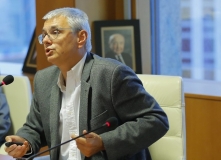
Sıtkı Egeli participated as a guest speaker at the HCOC Seminar
Faculty member of IUE Political Science and International Relations, Assoc. Prof. Dr. Sıtkı Egeli participated as a guest speaker at the HCOC
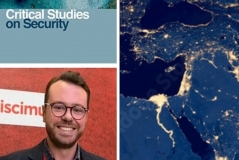
Umut Can Adısönmez's New Article Published in the Journal "Critical Studies on Security"
Faculty member of IUE Political Science and International Relations, Dr. Umut Can Adısönmez and Assoc. Prof. Laçin İdil Öztığ from Yıldız Technical
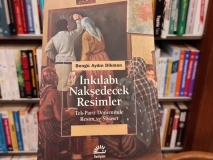
Dr. Bengü Aydın Dikmen's new book "İnkılabı Nakşedecek Resimler" is published!
Bengü Aydın Dikmen focuses on the painting policy during the foundation and construction period of the Republic. In this way, she also
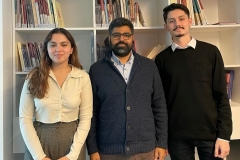
Serhun Al and Umut Can Adısönmez Lectured on Conflict Resolution and Peace Building
Faculty member of IUE Political Science and International Relations, Dr. Serhun Al and Dr. Umut Can Adısönmez, participated as trainers in the

Umut Can Adısönmez participated in the "Human Security and Resilience in South East Europe" Panel
Faculty member of IUE Political Science and International Relations, Dr. Umut Can Adısönmez participated in the panel discussion "Human Security and Resilience
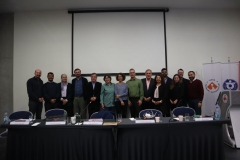
We Organized Our Republican Centennial Symposium
As the IUE Political Science and International Relations Department, we organized a symposium on the Centennial of our republic. In the symposium
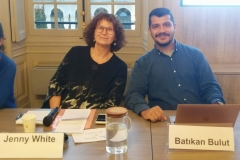
Batıkan Bulut presented his proceeding on the CEST 2023 Paris Symposium
Research assistant of the IUE Department of Political Science and International Relations, Batıkan Bulut presented his paper titled "Civil Society and Competitive



